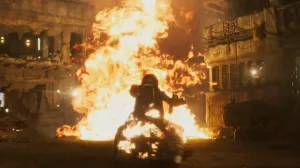
Welcome to another iteration of an argument superhero fans have been having for decades. As someone who has been professionally writing about superhero comics on the internet for five years (and doing it unprofessionally even longer), this is a common one that has taken a very familiar form. It centers on the most popular superhero in comics today and for much of the genre’s existence: Batman, is he good or bad?
Videos by ComicBook.com
The argument typically surfaces when someone writes an article or tweet with a title much like the piece you are reading right now. It indicates that Batman is not the great hero he is revered to be both by fictional Gothamites and very real fans, but a force for injustice or worse. This sometimes features the ludicrous expenditures of wealth spent on maintaining a private enterprise of crime-fighting labs, vehicles, and weapons, instead of on charity. It sometimes focuses on how Batman uses child soldiers relabeled as sidekicks. And sometimes it points out that many of Batman’s foes don’t deserve the violent form of “justice” they receive. The purpose of these various arguments lays out a contrarian point of view, which is inevitably argued against by focusing on the fictional reality of Gotham City, the suspension of disbelief in fiction, and plenty of other well-grounded concepts.
This is not the final word on whether Batman is good or bad, because that question itself presents an unsolvable problem. It contains the premise that there is only one Batman and that understanding him is as dichotomous of an affair as the one between hero and villain in superhero comics. It’s an argument we would be well served in moving past, but in order to do so it’s useful to start with the controversial position: That Batman, a superhero with global popularity and adoration, is simply terrible, just the absolute worst.

Batman is the Absolute Worst
For the sake of this argument (and time), I’m going to focus on one specific critique of Batman. In this case, I’m approaching Batman with a similar eye to Grant Morrison. Batman is not a specific character as detailed by a story or creator, he is the sum of all of his parts; Batman is a giant concept composed of comics, film, cartoons, and other media that everyone sees a little bit differently. This vision of Batman as a shared cultural concept is key to understanding what comes next.
Batman is the absolute worst because he supports and reinforces a society where people who live in poverty, exist with mental illness, or undergo severe trauma are treated with violence and disregard. Both common criminals and supervillains in Gotham City either go to prison (i.e. Blackgate) or a mental health facility (i.e. Arkham), both of which are underfunded and keep their prisoners in sub-optimal conditions. Gotham City itself is a city besieged by crime and the only solution to this crime is to fight it in a literal sense. No matter what else Batman does, the city remains in a semi-constant state of peril as the same people (both criminals and supervillains) repeatedly engage in recidivism. There is no fixing the criminal class of people, as evidenced by Batman’s large and consistent rogues gallery, only a temporary solution in imprisoning them.
That expansive narrative is more or less present in various presentations of Batman, but it is a consistent element across decades of multimedia Batman stories. There are exceptions to the rule, but they all stand out as exceptions. What that leaves is a meta-narrative about what crime is and how it should be addressed. In this case Batman is the noble hero who does what is necessary, and what is necessary is the forceful implementation of a carceral-police state. Violence, imprisonment, shoddy conditions, and fear of victimhood are all part of the status quo. The story of Batman becomes a story of accepting that we need to treat anyone labeled as a criminal violently and that these human beings are best kept away from other parts of society.
If you accept and appreciate that vision of society, Batman remains a hero. However, if you object to such large-scale dehumanization and believe crime is a societal, not an individual, problem, then this version of Batman is clearly a villain. Strains of fascist and authoritarian ideology creep throughout this big picture narrative and the Batman a figure of hegemonic injustice, just the absolute worst.

Batman Isn’t That Bad
Now, before anyone runs to the comments section to explain why Batman is the best and the author is a fool who shouldn’t be allowed to write about superheroes, I’d like to confess that I really love Batman. I don’t like every Batman story, but have found a lot over the years that have provided plenty of enjoyment and some that have even influenced by views on literature and ethics.
Rather than going to the well of classics, like Batman: Year One, I’d like to pull out a modern example in “Zero Year,” the 12-part story created by Scott Snyder and Greg Capullo that retells Batman’s origin in the New 52 era of DC Comics. Broken into three distinct conflicts, the story grapples with a lot of modern fears and anxieties utilizing Batman as a powerful, young person who is not sure whether he can confront (or survive) this world. Topics like terrorism and the digital age are raised in a story that is ultimately empowering. Batman’s power, both as a superhero and wealthy individual, are focused by experience to make Gotham City better than its final state as a literal urban jungle. Despite any flaws critics may find with the narrative, it is ultimately one that would reject the prior argument that Batman is the worst. In this case his relationship with violence, the carceral state, and maintenance of the status quo are all challenged. It also provides a somehow enjoyable outlet for working through and understanding the anxieties of living in post-9/11 America.
There are plenty of examples like this within the extensive Batman canon. Some, like Batman: The Dark Knight Return, lean more heavily on the hegemonic issue previously expressed, while others reject it altogether. This doesn’t create a counter-argument for why Batman is the best or why the previous idea is wrong. It reveals another way to look at the idea of Batman, a different argument altogether.

Batman Can and Should be Many Things
For many years superheroes were a niche genre primarily contained in local comic book stores. The concept of any story reaching one million or more readers was ludicrous. That isn’t the case with the superhero genre in 2019. Film, television, and the internet have all been essential in making superheroes one of the most powerful cultural forces of the modern era. They dominate movie theaters and a significant portion of memes are pure nonsense if you don’t know what the MCU is. That elevated profile has both expanded the number of conversations surrounding superheroes and the importance of those conversations. If we want to understand popular culture in 2019, we absolutely need to understand superhero stories and how they interact with forces beyond themselves.
There’s value to be found in a societal critique of Batman being a hegemonic force of social injustice and a literary reading of Batman as an empowering figure in the face of seemingly unstoppable ills. There’s also still value to be found in just enjoying a Batman comic as a brief escape from reality. These arguments don’t run contrary to one another; they expose Batman as being a genuinely important figure in our culture, one that should be studied, critiqued, and celebrated.
This also places the onus on the many experts who possess a great deal of knowledge about Batman, and the superhero genre more broadly, to share that knowledge and learn how it intersects with other fields. Batman is no longer just a children’s hero being read by a relatively small audience, and he requires a more robust conversation in order to be understood. That conversation will include all sorts of new perspectives, none of which inherently undermines any other. It will require that we speak, write, and listen more carefully to understand and be understood when discussing Batman, though. That’s how we can make it clear why superheroes have resonated for a century so far, and why Batman has never been more important to understanding the world than in this very moment.








